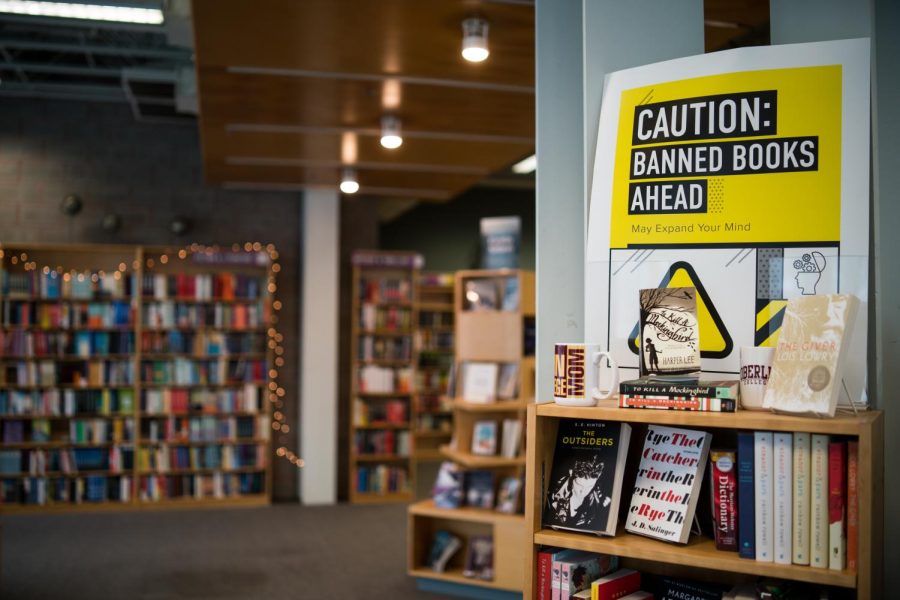Book Banning Inhibits Education on Both Sides of Political Spectrum
The Oberlin Bookstore displays popular banned books.
Across the nation, schools and libraries have faced calls to remove certain books that are deemed “inappropriate.” Now, before I go any further, I want to recognize that book banning is not a process that only conservatives are guilty of. Those on the left are also complicit in banning books and restricting certain texts. To Kill a Mockingbird and Adventures of Huckleberry Finn are two of many texts that both of these groups have argued should be removed from educational curriculums. I’m not saying that the motivations of both the left and the right are the same in doing so, just that they both engage in the practice.
Banning books gets right at the heart of a fundamental issue in our society, which is the question of how we should deal with topics that we either don’t agree on or that make us uncomfortable. I emphatically believe that banning books and suppressing unpopular opinions is not the correct path. This idea was articulated very clearly by 19th-century English philosopher John Stuart Mill in his influential essay On Liberty. In this essay, Mill defends the idea that society should protect freedom of speech and protect the rights of individuals to express deeply unpopular beliefs. Mill provides multiple reasons why we should maintain freedom of speech and oppose censorship. Many times throughout history, we’ve seen individuals who have been ostracized, jailed, or even killed for expressing a thought or belief that was not in line with the mainstream thinking of the time. A few examples that come to mind are Galileo Galilei and Socrates. Galileo championed the theory of Copernican heliocentrism — the theory that the Sun was the center of the Solar System instead of the Earth — and was met with serious opposition from within the Catholic Church. He was eventually sentenced to house arrest until his death, and his written works were banned from future publication. Socrates was a renowned Greek philosopher and developer of the Socratic method, among many other forms of logical argumentation and reasoning. He is incredibly influential to this day and is often credited as the father of Western philosophy. Yet he was sentenced to death for allegedly corrupting the youth and failing to acknowledge the city’s official gods. These are two of countless historical examples of figures who were censored or put to death for speaking the truth against the common belief at the time. Mill argues that, because of this, we ought to stray away from censoring ideas because it is possible that, despite being unpopular, these beliefs may, in fact be true.
Mill also argues that, by censoring false ideas, we risk true beliefs losing their meaning. The only way by which true beliefs maintain their validity and meaning is if they are challenged and reaffirmed as true, despite objections. It is true that we may hold many core beliefs which we believe to be objectively true, but if we never challenge such beliefs, how can we be so certain of their truth? As Mill puts it, “He who knows only his own side of the case knows little of that. His reasons may be good, and no one may have been able to refute them. But if he is equally unable to refute the reasons on the opposite side, if he does not so much as know what they are, he has no ground for preferring either opinion.”
Book banning represents a troubling movement that seeks to silence unpopular opinions and positions. It refuses to engage with differing positions and refute them on their own merits. I worry sometimes that Oberlin is a hotbed for ideological dogmatism to thrive and a place where students can go their whole time here without ever seriously encountering a conservative idea. Banning books, especially in educational spaces, fundamentally misunderstands the purpose of education. Our education system should not always be a place of intellectual or ideological safety. Of course, physical safety is paramount, but there is not a right to intellectual or ideological safety.
In fact, providing such a space hinders educational growth and progress. You should be made uncomfortable and have your ideas and beliefs challenged — even your most closely held beliefs. If an institution fails to do so, it fails to prepare you to be a critical thinker and an informed citizen. Whether it’s Republican lawmakers banning books and courses that don’t conform to their white patriarchal heteronormative worldview or educational institutions refining their curriculum to remove authors or ideas that could be considered offensive or problematic, both commit the same mistake of viewing education as something meant to be free of potentially offensive content. Exploring potentially offensive content in an educational environment isn’t something that should be avoided — it should be embraced. John Stuart Mill said that the best way to combat a harmful idea is with a better one.





